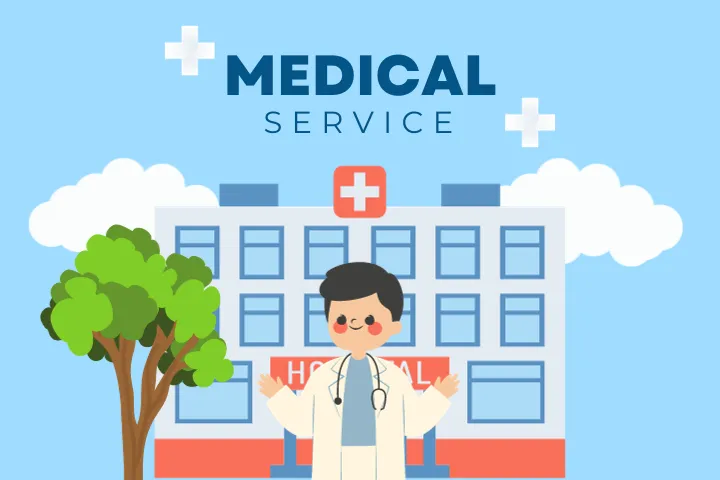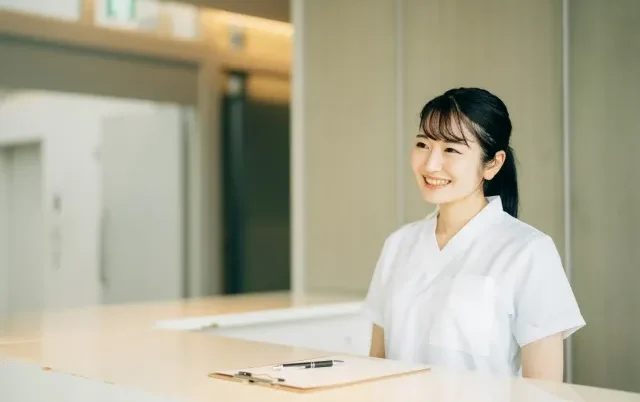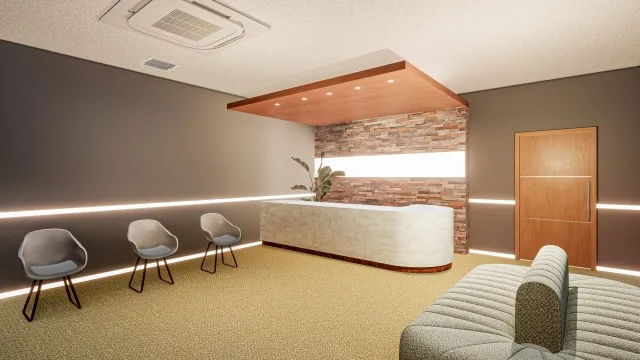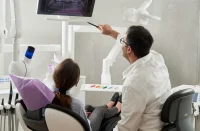Don't get in trouble at Japanese hospitals! Solutions for Foreigners

For foreign residents living in Japan, accessing medical facilities in the event of illness or injury can be an uncomfortable experience. The language barrier and cultural differences can be confusing. But don't worry. If you know the key points for choosing a hospital and the procedures for receiving medical care, you can receive medical services smoothly.
In this article, we have compiled useful information for foreigners to know, ranging from basic knowledge about the Japanese medical system to how to obtain medicines and what to do in an emergency. We also provide detailed explanations of how to pay medical bills, how to use insurance, and other details closely related to daily life, so please be sure to refer to this article for more information.
▼Goandup Picks Click here for recommended articles!
- Required before studying abroad! Goandup Nihongo+, an online Japanese language learning service
- This page introduces services for foreigners who wish to study in Japan or improve their Japanese language skills to learn Japanese online.
- Goandup Salon" community for foreigners living in Japan
- We introduce an online community where foreigners living in Japan can exchange information and interact with each other to support their life in Japan.
- Goandup Study" supports foreigners who want to study in Japan.
- This section introduces study abroad support services that provide comprehensive support to foreigners who wish to study in Japan, from preparation for study abroad to living in Japan.
- Where can I buy a prepaid SIM in Japan? Recommended SIM cards for foreigners are also introduced.
- How to purchase a prepaid SIM and suitable SIM cards for foreigners.
- The Complete Guide to Pocket Wi-Fi in Japan for Foreigners!
- We introduce how to select and recommend pocket Wi-Fi products that can be used conveniently in Japan.
- The Complete Guide to Finding a Job in Japan! Finding a job, changing jobs, and part-time work for foreigners
- This site provides foreigners who want to work in Japan with comprehensive information on how to find a job, recommended job sites, and other information necessary to find a job.
1: Points to consider when selecting a hospital

When foreigners choose a hospital in Japan, it is important to select one based primarily on language support, availability of medical facilities, and availability of medical specialists. Although Japanese medical services are of high quality, language barriers and cultural differences can make them difficult for foreigners to use. Therefore, in order for foreigners to feel comfortable choosing a medical institution, we will explain in detail the key points for selecting a hospital here.
Reception counter for foreigners
First, let's talk about the reception counter, which is the first thing foreigners face when they come to a hospital. In general, Japanese hospitals often do not have sufficient English-language support. The language barrier is a major cause for concern, but in recent years, an increasing number of hospitals have installed foreign-language reception counters. At such counters, you can rest assured that multilingual staff will be courteous and helpful. We recommend that you check the hospital's website or call in advance.
Interpretation Services
To overcome the language barrier, many hospitals offer interpretation services. A professional medical interpreter will accompany you and explain in detail about your medical examination and procedures. However, it is important to check the hospital's website or call the hospital to confirm the availability of the service, as an advance appointment may be required. Some hospitals also offer telephone interpretation services. This is a convenient service that provides real-time interpretation of your communication with the hospital receptionist or nurse.
Providing multilingual information
It is very helpful to foreign patients if hospital information displays and materials are multilingual. Recently, multilingual support has been increasing, but it is still insufficient in some hospitals. Some hospitals have begun to make advanced use of ICT, such as using QR codes to provide multilingual information and tablet terminals to provide multilingual explanations of medical treatment. At such hospitals, patients will be able to receive medical services smoothly without feeling any language barriers.
Identification of medical facilities and specialists
Some symptoms and diseases require specialized departments and equipment. General hospitals offer a wide range of medical departments, but there are cases in which a specialized hospital may be more suitable. Before you go to a hospital, check to see if there is a department or specialist that can help you with your condition. For example, in highly specialized fields such as orthopedics or dental surgery, facilities and physician experience are important.
Research on the Web
An effective way to find the right medical facility for you is to gather information from hospital websites. Take the time to check the website for detailed information on medical specialties, doctors' profiles, and available languages. Some hospitals also provide multilingual contact forms and e-mail addresses. You may be able to communicate your symptoms and needs and get answers. Gathering information online can help ease your anxiety before coming to the hospital.
Check word of mouth and reputation
The reputation of patients who have actually used a hospital is a major factor in making a decision to choose a medical institution. On the Internet, you can read the opinions and experiences of foreign patients about Japanese hospitals on word-of-mouth sites. However, many evaluations are based on the subjective opinions of individuals, so it is important to use them only as a reference. Choose information you can trust and make a comprehensive judgment based on multiple reviews. It is also recommended to hear directly from acquaintances and friends to obtain realistic information.
2: Reservation and reception expertise

It is important to understand how to make an appointment and the reception procedure at Japanese hospitals in order to receive medical services smoothly. It can be confusing when using a hospital for the first time, but with the specific know-how explained here, you should be able to use a hospital with peace of mind.
Use of online reservations
Many hospitals are now offering online appointments through their websites or apps. By making an appointment before coming to the hospital, you can greatly reduce the waiting time on the day of your visit. On the online reservation page, select the subject, doctor, and desired date and time to complete the reservation. Some hospitals also have a system whereby you will receive an e-mail confirmation of your appointment. The number of hospitals that support online reservations is expected to increase further in the future, so we would like to make active use of this service.
What you need to do at the reception desk
When you arrive at the hospital, you must first provide the necessary information at the reception counter. If this is your first visit, you will need to provide your name, date of birth, address, contact information, and insurance card. You will also be asked to fill out a medical questionnaire. Here, it is important to accurately state your symptoms, medical history, medications you are taking, and any allergies you may have. If it is difficult to fill out the form in Japanese, some hospitals provide a medical questionnaire in English. Please ask the staff to assist you.
Use of waiting time
Once you have checked in, you will spend time in the waiting room until you are called to see the doctor. Make the most of this time. Some hospitals have Wi-Fi in the waiting room. Use your smartphone or tablet to work or entertain yourself. It is also a good idea to read hospital brochures and information magazines to learn about the hospital's features and initiatives. Bringing reading materials to spend time waiting is also a good idea.
Procedures after consultation
Once you have been seen, you will need to get your prescriptions, information about your next appointment, and the bill. The prescription is a document needed to pick up your medication in the hospital or at a nearby pharmacy. Your next appointment will be instructed by your doctor based on your medical condition. Accounting is done at an automated teller machine or cash register. Some hospitals accept credit cards or electronic money for this purpose. Keep your receipts in a safe place, as you will need them to file a medical expense deduction.
What to do in an emergency
If you have a sudden fever, pain, or injury that requires immediate medical attention, visit an emergency room. It is a good idea to make a list of emergency hospitals close to your home or office in advance. In an emergency, first call the hospital and inform them of your symptoms. Do not forget to tell them that you are a foreigner. If possible, take a cab or other means to the hospital. To call an ambulance, dial 119. Explain the situation slowly and clearly, including the extent and location of your injuries.
3: How to obtain medicine

It is common to use an out-of-hospital pharmacy to pick up prescription medications from the hospital. Another option for mild symptoms is to purchase over-the-counter medications at pharmacies or drugstores. Here are some ways for foreigners to obtain medicines in Japan with peace of mind.
How to receive prescription drugs given at the hospital
After the doctor issues a prescription as a result of the consultation, the patient takes it to an insurance pharmacy outside the hospital. At the pharmacy, the pharmacist will dispense the medication based on the prescription and explain how to take it and what precautions to take.
Submit your prescription at the pharmacy's reception desk and present your name and insurance card. If this is your first time at the pharmacy, you may need to fill out an address and contact information. Wait in the waiting area until your medication is ready.
When the medication is ready, your name will be called and you will go to the pick-up counter. You will pay for the medication and receive an information sheet and a statement of the medication along with it. At this time, it is important to ask carefully how to take the medication. Do not hesitate to ask questions if you forget to take the medication or if you have any questions about taking the medication together.
As a rule, prescriptions are valid for four days. If you do not receive it within 4 days, consult your health care provider.
Where to buy over-the-counter medicines
If you have some symptoms that are not enough to visit a hospital, over-the-counter medicines are the way to go. In Japan, a variety of over-the-counter medicines are available at pharmacies and drugstores.
Pharmacies sell not only prescription drugs that require a prescription, but also over-the-counter (OTC) drugs that can be purchased without a prescription. Pharmacies always have pharmacists available, so you can choose the medicine that best suits your symptoms and constitution while consulting with them. Drugstores, on the other hand, carry a wide range of OTC drugs, along with daily necessities and cosmetics, which you can consult with the sales staff.
A wide variety of over-the-counter medicines are available, including antipyretic analgesics, cold remedies, stomach remedies, allergy medicines, and topical medicines, so if you feel unwell, you should first visit a pharmacy or drugstore near you.
4: How to call an ambulance and useful information for emergencies

In the event of a sudden illness, injury, or other emergency, appropriate action is required. You may feel discouraged, especially if you encounter an emergency situation in a foreign country you are not accustomed to. However, there is no need to panic. Here, we will tell you how to call an ambulance in Japan and give you useful information in an emergency.
Calling an ambulance in Japan by dialing 119
In Japan, when calling for an ambulance, dial 119. 119 also serves as the fire department, so tell the operator "I need an ambulance. The operator will ask you your name, address, and symptoms.
At this time, do not forget to tell them "I am a foreigner. Try to speak as slowly and clearly as possible. Some areas have English speaking phones, but if English is not spoken, explain the situation as best you can with gestures.
Ambulances are available free of charge to anyone, regardless of nationality. However, it is good manners to refrain from using an ambulance in case of minor illness. If it is not an emergency, use a cab or bus.
List of Hospitals Ready to Accept Foreigners
If you are sent to an emergency room, it is best to have a hospital selected that can provide foreign language services. Each prefecture has a list of hospitals that are prepared to accept foreign patients.
For example, the website of the Bureau of Social Welfare and Public Health of the Tokyo Metropolitan Government provides a "List of Medical Facilities with Foreign Language Services. Hospitals can be searched by language, such as English, Chinese, Korean, etc.
Private websites also provide a wealth of information on medical facilities for foreigners. It is recommended to check reliable websites such as "Japan Healthcare Info" and "JNTO" in advance.
Reference:Medical Institution Search - Foreign Patient Acceptance Information Site
In the event of an emergency, you can rely on this information to select the appropriate medical facility. It is important to be prepared in advance because of emergencies.
It is also a good idea to know the emergency phone numbers and where to go for help in Japan in case of an emergency. Please check out our article covering police, fire, ambulance, and other useful emergency contact numbers.
▶︎ List of emergency telephone numbers and consultation in Japan: covering police, fire, ambulance, etc.
5: Medical Insurance and Payment Mechanisms

The Japanese medical insurance system may seem difficult for foreigners. However, once you understand the basic structure of the system, you can make good use of it. Here, we will explain in detail the features of Japanese medical insurance, how to use it, and the consultation service.
Features of Japan's Medical Insurance System
Japan's medical insurance system is based on a universal health insurance system. This system requires all citizens to be enrolled in some form of public medical insurance. Foreign nationals can also join the public medical insurance system if they meet certain requirements.
There are two main types of public medical insurance: Kenko Hoken (health insurance) and Kokumin Kenko Hoken (national health insurance). Company employees and their family members are covered by Kenko Hoken, while the self-employed and unemployed are covered by National Health Insurance.
When you visit a medical institution, medical insurance will pay from 70% to 90% of the medical expenses. The co-payment amount varies depending on age and income, but usually ranges from 10% to 30% of medical expenses. If you incur high medical expenses, there is a cap on the co-payment amount.
How to Use Insurance
Always bring your insurance card when you visit a medical institution. The insurance card is presented at the reception desk of the hospital. This allows you to pay only the co-payment amount.
The insurance card depends on the medical insurance you have joined. In the case of health insurance, the "Kenko Hoken Hihoken Hihokenshasho" issued by your employer is your insurance card. On the other hand, in the case of national health insurance, the insurance card is the "National Health Insurance Certificate" issued by the municipal government.
If you do not have medical insurance, you will be responsible for the full amount. Medical expenses can be expensive, so it is recommended that you purchase as much insurance as possible.
Use of insurance consultation services
If you have any questions about medical insurance, use the insurance consultation service. In the case of National Health Insurance, the consultation service is available at the National Health Insurance Section of the city, ward, town or village where you are enrolled.
In the case of health insurance, your health insurance association or the National Health Insurance Association (Kyokai Kenpo) will provide consultation. Some contact points are available in foreign languages, so it is advisable to check with them.
In addition, the General Consultation Support Center for Foreign Residents provides consultation on medical insurance in multiple languages. Consultation is available by phone or e-mail, and can be accessed from anywhere in Japan.
Medical insurance is a strong ally in the event of illness or injury. We want to understand how the insurance works and make good use of it in case of emergencies.
Since there are various types of health insurance in Japan and the insurance to be purchased depends on the type of work, it is important to understand the coverage and enrollment process for each type of insurance. Please refer to the following article for more details.
▶︎ What are the types of health insurance in Japan? Explanation of distinctions by occupation, coverage, and enrollment methods
6: Hospital Manners and Culture

Hospitals have manners and cultures unique to their countries. You may be confused by customs that are different from those of your own country. However, if you understand the local culture and try to behave appropriately, you should be able to use the hospital smoothly. Here, we will tell you about the cultural differences in Japanese hospitals and the manners when visiting them.
Understanding of cultural differences
Japanese hospitals have several unique cultures and rules.
First, when you fill out the application form for medical examination at the reception desk, you need to write down your symptoms in detail. This is because the Japanese style of medical treatment tends to emphasize the patient's own declaration of symptoms rather than the doctor's eliciting them through a medical interview.
In addition, it is common for Japanese hospitals to have a "family doctor" close to home. For minor symptoms such as a cold, visit your family doctor first. If you need specialized treatment, you will be referred to a larger hospital.
In the hospital, private conversations are expected to be kept to a minimum out of consideration for other patients. It is not appropriate to talk loudly or make a lot of noise. Try to stay quiet. In addition, eating and drinking are not permitted in many hospitals.
Hospital Considerations
Japanese hospitals are also making progress year by year in their consideration for foreign patients.
For example, an increasing number of hospitals are providing multilingual information boards and materials. Some hospitals also have interpreting staff and multilingual staff.
Prayer space may be provided in the hospital. If you need special accommodations for religious reasons, please consult with the staff.
Some hospital cafeterias offer menus that take religious restrictions and preferences into consideration. It is a good idea to consult with a dietitian or nutritionist in advance.
Thus, Japanese medical institutions are becoming better prepared to receive foreign patients. However, it is still not enough. When using hospitals, it is important to actively gather information and communicate with them.
Serious employment support to help you realize your dream of working in Japan!

Do you want to work in Japan?
Let us "Goandup" make that dream a reality!
【 Program Features 】
✅ JLPT N3 level Japanese language acquisition
✅ Thorough preparation for the specific skills test
✅ Full support for job hunting in Japan
Business-focused one-on-one lessons will help you find a job in Japan in the shortest possible time.
【 Program Menu 】
- Individual Japanese language lessons
- Intensive curriculum to obtain N3, especially specialized lessons for business Japanese that can be used at work.
- Intensive curriculum to obtain N3, especially specialized lessons for business Japanese that can be used at work.
- Preparation for the Specific Skills Test
- Customized materials for specific skill tests will be used to focus on frequently asked questions and learning to pass the test.
- Customized materials for specific skill tests will be used to focus on frequently asked questions and learning to pass the test.
- Resume and CV support
- To create resumes and CVs tailored to Japanese corporate culture, and to brush up on self-promotion and motivation for application.
- To create resumes and CVs tailored to Japanese corporate culture, and to brush up on self-promotion and motivation for application.
- Interview Preparation
- Guidance on areas for improvement through mock interviews and feedback based on corporate interview scenarios. Learn interview etiquette and behavior unique to Japan.
- Guidance on areas for improvement through mock interviews and feedback based on corporate interview scenarios. Learn interview etiquette and behavior unique to Japan.
- career consulting
- Provide introductions to companies that match the participant's career goals, select companies to apply to, and provide advice on the level of knowledge required by the companies to which the participant is applying.
- Provide introductions to companies that match the participant's career goals, select companies to apply to, and provide advice on the level of knowledge required by the companies to which the participant is applying.
- Chat Support
- In addition to one-on-one individual lessons, we also accept casual questions via DM (visa application, living support, assistance in finding a room, etc.).
If you are serious about your career in Japan, join us now!
▶︎ for more informationclick here.
We will do our best to support your success in Japan!
summary
Some aspects of Japanese medical services may be difficult for foreigners to use. However, if you understand how to choose a hospital, the procedures at the reception desk, and the medical insurance system, you should be able to receive medical services without problems. When in trouble, it is also important to actively ask for help from those around you. Many Japanese people are not accustomed to helping foreigners, but they should be able to help you in good faith.
In addition, this article will help you to be prepared in advance so that you will not panic in case of an emergency. For example, it is a good idea to make a list of hospitals with English-speaking staff and to check insurance consultation services.
We hope that all foreign residents will be able to live in Japan without having to worry about medical care.
Your support will help us!
Thank you for visiting Goandup Picks. Our mission is to provide you with more useful information to show the world what Japan has to offer.
Your support will help us to further enhance our activities, so please support us!






